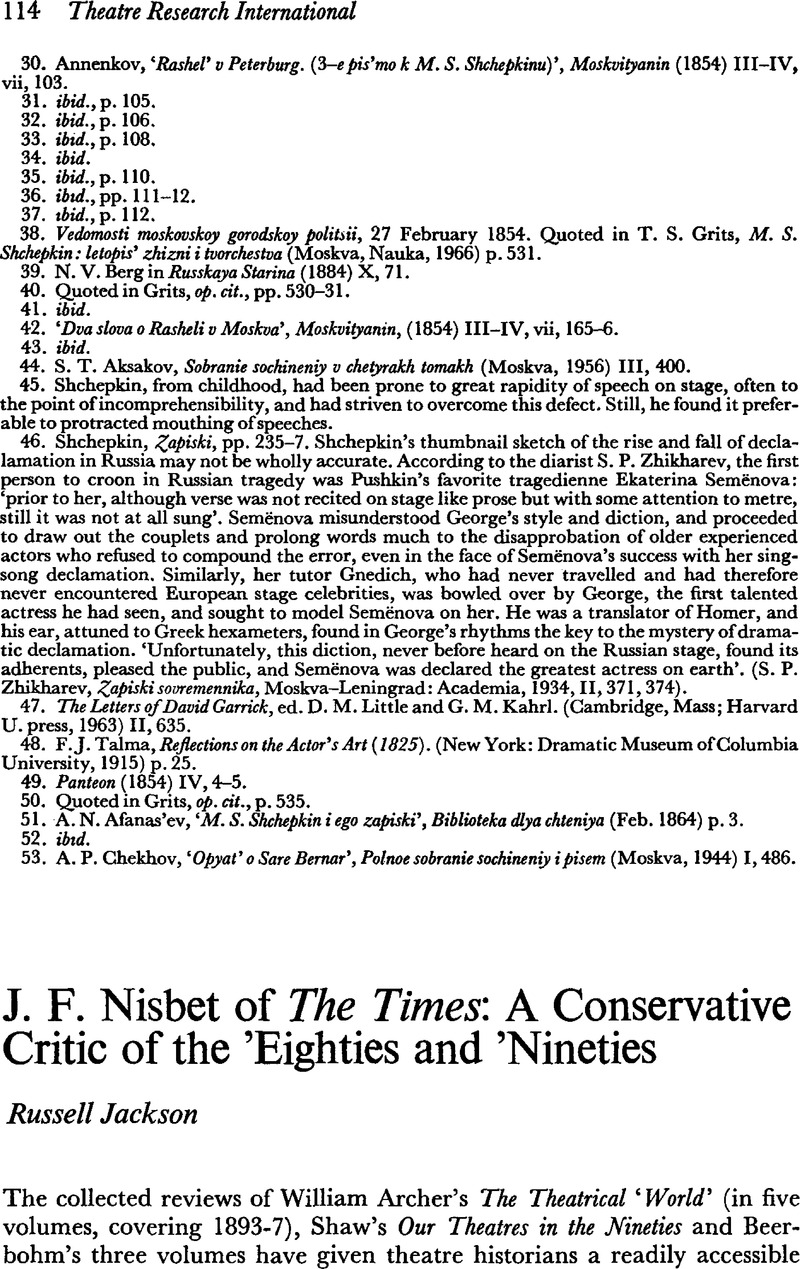No CrossRef data available.
Article contents
J. F. Nisbet of The Times: A Conservative Critic of the 'Eighties and 'Nineties
Published online by Cambridge University Press: 23 January 2009
Abstract

- Type
- Articles
- Information
- Copyright
- Copyright © International Federation for Theatre Research 1978
References
Notes
1. In addition to English Dramatists of Today (1882) and About the Theatre (1886) Archer contributed ‘a sketch of the London season’ to Fuller, Edward's The Dramatic Year (1888)Google Scholar. A number of periodical articles by Henry Arthur Jones were reprinted as The Renascence of the English Drama (1895), and collections by Cook, Dutton (Nights at the Play, 1883)Google Scholar and Walkley, A. B. (Playhouse Impressions, 1892)Google Scholar included reviews from 1867–81 and 1890–2, respectively. Scott's, ClementFrom ‘The Bells’ to ‘King Arthur’ (1896)Google Scholar dealt with Lyceum productions, 1871–1895.
2. Scott, , The Drama of Yesterday and Today (2 vols., 1899) I. 274–5Google Scholar. The DNB article by Robin H. Legge notes that Oxenford had been appointed in 1850 (DNB XLIII (1895) 12–13)Google Scholar. In 1875 a premature applicant for the job was put off with the candid advice, ‘If you want to see its realities look at Oxenford, who has not dared for years to tell the truth about our stage, tho' it wanted the truth badly’ (copy of letter from Macdonald, J. C. to Stephens, H. P., The Times archives, Managerial Letterbook 18/268).Google Scholar
3. Reade, Arthur, Literary Success: Being a Guide to Practical Journalism (1880), p. 93.Google Scholar
4. ‘Our Omnibus-Box’, The Theatre, n.s. VI (08 1882) 106–111Google Scholar: style and content make it unlikely that anyone but Scott wrote the passage. In October, Scott printed a further refutation this time by ‘a correspondent of great experience and a very old play-goer’.
5. On Morris, cf. Plair, Victor G., ed., Men and Women of the Time: a Dictionary of Contemporaries (15th ed., 1890).Google Scholar
6. Oxenford, letter to Stebbing, William, 21 12 1876Google Scholar (The London Library, Stebbing papers: photocopy in The Times archive). Stebbing was assistant editor of the paper 1870–8. Cf. The History of ‘The Times’; II (1939) pp. 498, 513–4.Google Scholar
7. Copy in The Times archive, Managerial Letterbook 20/386–7.
8. The Managerial Diaries in The Times archives identify, day by day, the authors of leading and special articles, but not those of regular columns or news reports. The annotated file of the Paper, from 1896-, was not available for inspection at the time of writing. Nisbet's entry in Who Was Who (1915) runs; ‘journalist; dramatic critic of The Times from 1882; b. Lanarkshire 28 Oct. 1851. Educ: Glasgow University. Nearly 20 years a writer of special articles for The Times; wrote extensively in the weekly and periodical press. Publication: chiefly a psychophysiological treatise entitled The Insanity of Genius. Recreation: Chess. Club: Savage.’
9. Both phrases are from Arnold's ‘The French Play in London’, published in 1879: cf. Super's, R. H. edition, The Complete Prose Works …, IX (Ann Arbor, 1973) pp. 81Google Scholar (lines 5–6, ‘finding the English theatre without organisation, or purpose, or dignity’) and 83 (line 20).
10. The play in question is Lady Clare (Globe, 11 April 1883), in which Nisbet claimed to have detected unacknowledged borrowings from three French pieces (cf. The Times, 13 04 1883)Google Scholar. In ‘The French Play in London’ Arnold had written of the ‘sense of incurable falsity’ created by the attempt to reproduce French attitudes and manners on the English stage.
11. Nisbet is probably referring to de Goncourt's Germinie Lacerteux, an adaptation of which was performed at the Odéon in 1888.
12. He shared with other comtemporaries a fear that Drury Lane pantomimes had become ‘vehicles for display, interspersed with music hall business’ (1888), and believed that the dying three act burlesque had been superseded by the Savoy Operas (For example, in 1890, ‘if comic opera may be regarded as burlesque, mention should be made of The Gondoliers’). Cf. Archer, , About the Theatre (1886), pp. 21–2Google Scholar, for a similar view.
13. Pinero, to Archer, , 25 10 1892Google Scholar, in Wearing, J. P., ed., The Collected Letters of Sir Arthur Pinero (Minneapolis, 1974) p. 135.Google Scholar
14. The Theatre, n.s. XXX (11 1897) 259–260Google Scholar. The play opened in Birmingham on 27 September, and in London at the newly built Queen's Opera House, Crouch End, on 18 October.
15. Autograph letter in The Times archives, file on Drama Critics: printed by permission of The Royal General Theatrical Fund Association, owner of the subsisting copyright.
16. Memoranda from Bell, C. F. Moberly and Buckle, G. E., as note 15. Nisbet's plays were Cousin Johnny (Strand, 11 07 1885)Google Scholar and Dorothy Grey (Princess's, 10 04 1888 matinée)Google Scholar. The former was praised by , Scott in The Daily Telegraph as ‘a deep and refreshing draught of honest English comedy’ (15 07 1885)Google Scholar, the latter damned (‘may be conveniently put away and forgotten’; The Illustrated London News, 14 04 1888).Google Scholar
17. The London Morning, 3 04 1899Google Scholar, signed by Christie Murray (cutting in The Times archive, file on Drama Critics).
18. Details of Walkley's engagement are from correspondence in The Times archives, file on Drama Critics. Walkley's letter of acceptance (1 February 1890) stipulates that he will not have to attend suburban or matinée performances (the proliferation of which had long been an annoyance to busy critics) and will be allowed to continue his contributions to The Academy ‘when Shakespeare, or some play with pretensions to literature, is presented’.


